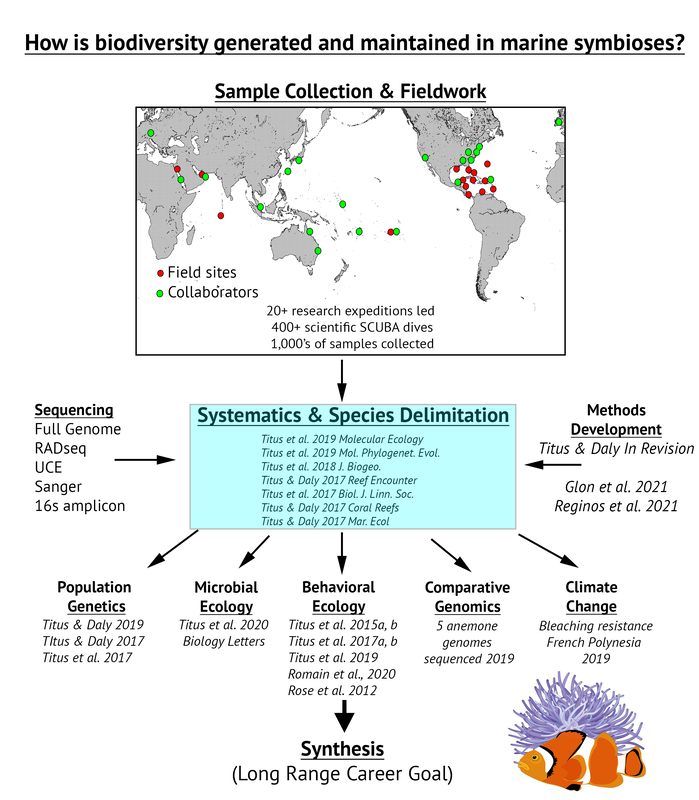Titus Lab Research
Mutualisms are ubiquitous and often ecologically dominant, and although broad conceptual frameworks exist, there remains no general theory of mutualism. This is, at least in part, due to the highly complex nature of mutualism- interactions range from obligate to facultative, ecto- or endosymbiotic, and transmission strategies can be either vertical or horizontal. But searching for general principles of mutualism is also hampered by misunderstanding individual case studies, which “requires a clear appreciation of the spatial, temporal, and taxonomic context in which these systems operate. Breakthroughs in understanding have, and will, come precisely because of the increased attention paid to the different ecological and evolutionary scales within which mutualisms function” (Herre et al., 1999 TREE).
The Titus Lab conducts research at all levels of biological organization to understand the evolutionary and ecological processes that generate biodiversity within mutualisms (Figure 1). We are especially focused on mutualisms found on tropical coral reefs, which are the most conspicuously mutualistic ecosystems on the planet, and among the most biodiverse. Our approach is highly interdisciplinary, strongly rooted in organismal biology, and guided by broad conceptual frameworks. The projects we develop span a continuum from broad Order-level phylogenetics to species delimitation, phylogeography, genome evolution, and microbial ecology. We also incorporate a strong field component in our research program and pursue community, population, and behavioral ecology. Ultimately, this allows us to understand our study systems holistically, and creates a dynamic positive feedback loop where all aspects of the research program inform, and are informed by, all other areas of our research.
Focal Taxa:
Organismally, our research program is centered on iconic sea anemone symbioses from tropical coral reefs. In the Indian and Pacific Oceans, we study the evolution and ecology of the clownfish-sea anemone symbiosis- with a special emphasis on the evolution and genomics of the sea anemone hosts themselves. In the Tropical Western Atlantic we work on symbioses between sea anemones and their crustacean symbionts- some of which are ecologically important cleaner species that remove parasites from >20 families of common reef fishes.
Currently Funded Areas of Research (click links for more detail):
1) Systematics & Species Delimitation of the Clownfish-Hosting Sea Anemones
2) Origin of Tropical Sea Anemone Diversity
3) Genomic Consequences and Convergence of a Model Marine Mutualism
4) Ecology & Evolution of Mutualistic Cleaning Behaviors
Where We Work:
Field Sites (link)
Current Funding:
National Science Foundation (DEB-SBS-1934274): PURSUIT: Systematics and Species Delimitation of the clownfish-hosting sea anemones. (Co-PI Dr. Estefania Rodriguez American Museum of Natural History) $740,000
The Titus Lab conducts research at all levels of biological organization to understand the evolutionary and ecological processes that generate biodiversity within mutualisms (Figure 1). We are especially focused on mutualisms found on tropical coral reefs, which are the most conspicuously mutualistic ecosystems on the planet, and among the most biodiverse. Our approach is highly interdisciplinary, strongly rooted in organismal biology, and guided by broad conceptual frameworks. The projects we develop span a continuum from broad Order-level phylogenetics to species delimitation, phylogeography, genome evolution, and microbial ecology. We also incorporate a strong field component in our research program and pursue community, population, and behavioral ecology. Ultimately, this allows us to understand our study systems holistically, and creates a dynamic positive feedback loop where all aspects of the research program inform, and are informed by, all other areas of our research.
Focal Taxa:
Organismally, our research program is centered on iconic sea anemone symbioses from tropical coral reefs. In the Indian and Pacific Oceans, we study the evolution and ecology of the clownfish-sea anemone symbiosis- with a special emphasis on the evolution and genomics of the sea anemone hosts themselves. In the Tropical Western Atlantic we work on symbioses between sea anemones and their crustacean symbionts- some of which are ecologically important cleaner species that remove parasites from >20 families of common reef fishes.
Currently Funded Areas of Research (click links for more detail):
1) Systematics & Species Delimitation of the Clownfish-Hosting Sea Anemones
2) Origin of Tropical Sea Anemone Diversity
3) Genomic Consequences and Convergence of a Model Marine Mutualism
4) Ecology & Evolution of Mutualistic Cleaning Behaviors
Where We Work:
Field Sites (link)
Current Funding:
National Science Foundation (DEB-SBS-1934274): PURSUIT: Systematics and Species Delimitation of the clownfish-hosting sea anemones. (Co-PI Dr. Estefania Rodriguez American Museum of Natural History) $740,000


